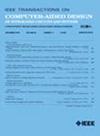ProVAT: An Automated Design and Analysis Framework for Process-Variation-Resilient Design of Silicon Photonic Microring Resonators
IF 2.7
3区 计算机科学
Q2 COMPUTER SCIENCE, HARDWARE & ARCHITECTURE
IEEE Transactions on Computer-Aided Design of Integrated Circuits and Systems
Pub Date : 2024-11-22
DOI:10.1109/TCAD.2024.3505078
引用次数: 0
Abstract
Silicon photonics promises revolutionary advancements in communication and computing, leveraging the integration of photonic components onto silicon platforms. However, a critical challenge remains in achieving robust device performance under inevitable process variations inherent in CMOS fabrication. Existing design methodologies often fall short in assessing and mitigating the impact of these variations on device behavior, particularly in microring resonators (MRRs). To address this challenge, we present a novel, comprehensive workflow for designing process-variation-resilient silicon photonic MRRs, which we have integrated into a variation-aware design optimization framework called process variation analysis tool. Our approach seamlessly integrates process-variation robustness directly into the design phase, enabling early optimization of device performance characteristics. By exploring diverse process-variation scenarios, our workflow provides crucial insights into design tradeoffs and strategies for enhancing MRR robustness. Furthermore, we achieve this analysis efficiently through the use of compact models, striking a balance between accuracy and computational cost. This approach significantly reduces design cycles and resource requirements, offering a practical and cost-effective path toward optimizing MRR performance under real-world manufacturing conditions.硅光子微环谐振器工艺变化弹性设计的自动化设计与分析框架
硅光子学将光子元件集成到硅平台上,有望在通信和计算方面取得革命性的进步。然而,在CMOS制造中不可避免的工艺变化下,实现稳健的器件性能仍然是一个关键的挑战。现有的设计方法往往不足以评估和减轻这些变化对器件行为的影响,特别是在微环谐振器(mrr)中。为了应对这一挑战,我们提出了一种新的、全面的工作流程,用于设计工艺变化弹性硅光子mrr,我们已经将其集成到一个称为工艺变化分析工具的变化感知设计优化框架中。我们的方法无缝地将工艺变化鲁棒性直接集成到设计阶段,从而实现设备性能特征的早期优化。通过探索不同的过程变化场景,我们的工作流程为增强MRR健壮性的设计权衡和策略提供了重要的见解。此外,我们通过使用紧凑模型有效地实现了这种分析,在准确性和计算成本之间取得了平衡。这种方法大大减少了设计周期和资源需求,为优化实际制造条件下的MRR性能提供了实用且经济有效的途径。
本文章由计算机程序翻译,如有差异,请以英文原文为准。
求助全文
约1分钟内获得全文
求助全文
来源期刊
CiteScore
5.60
自引率
13.80%
发文量
500
审稿时长
7 months
期刊介绍:
The purpose of this Transactions is to publish papers of interest to individuals in the area of computer-aided design of integrated circuits and systems composed of analog, digital, mixed-signal, optical, or microwave components. The aids include methods, models, algorithms, and man-machine interfaces for system-level, physical and logical design including: planning, synthesis, partitioning, modeling, simulation, layout, verification, testing, hardware-software co-design and documentation of integrated circuit and system designs of all complexities. Design tools and techniques for evaluating and designing integrated circuits and systems for metrics such as performance, power, reliability, testability, and security are a focus.

 求助内容:
求助内容: 应助结果提醒方式:
应助结果提醒方式:


